Personality and Development Theories Assignment - CHCCSL004 Unit
VerifiedAdded on 2023/01/12
|35
|7513
|1
Homework Assignment
AI Summary
This assignment, completed for the CHCCSL004 unit, explores various theories of personality and lifespan development, crucial for counselors. It covers the importance of understanding these theories, differentiating between nature and nurture influences, and examining the impact of genetic and environmental factors on clients, including case scenarios involving depression and alcohol abuse. The assignment also delves into Freud's psychoanalytic theory, including the id, ego, and superego, and how these concepts relate to behavior and psychological stages. The student answers questions about these theories and applies them to real-world scenarios, demonstrating an understanding of how these concepts apply to counselling practices. The assignment is designed to assess the student's knowledge of the material, with resubmission opportunities provided for areas needing improvement.
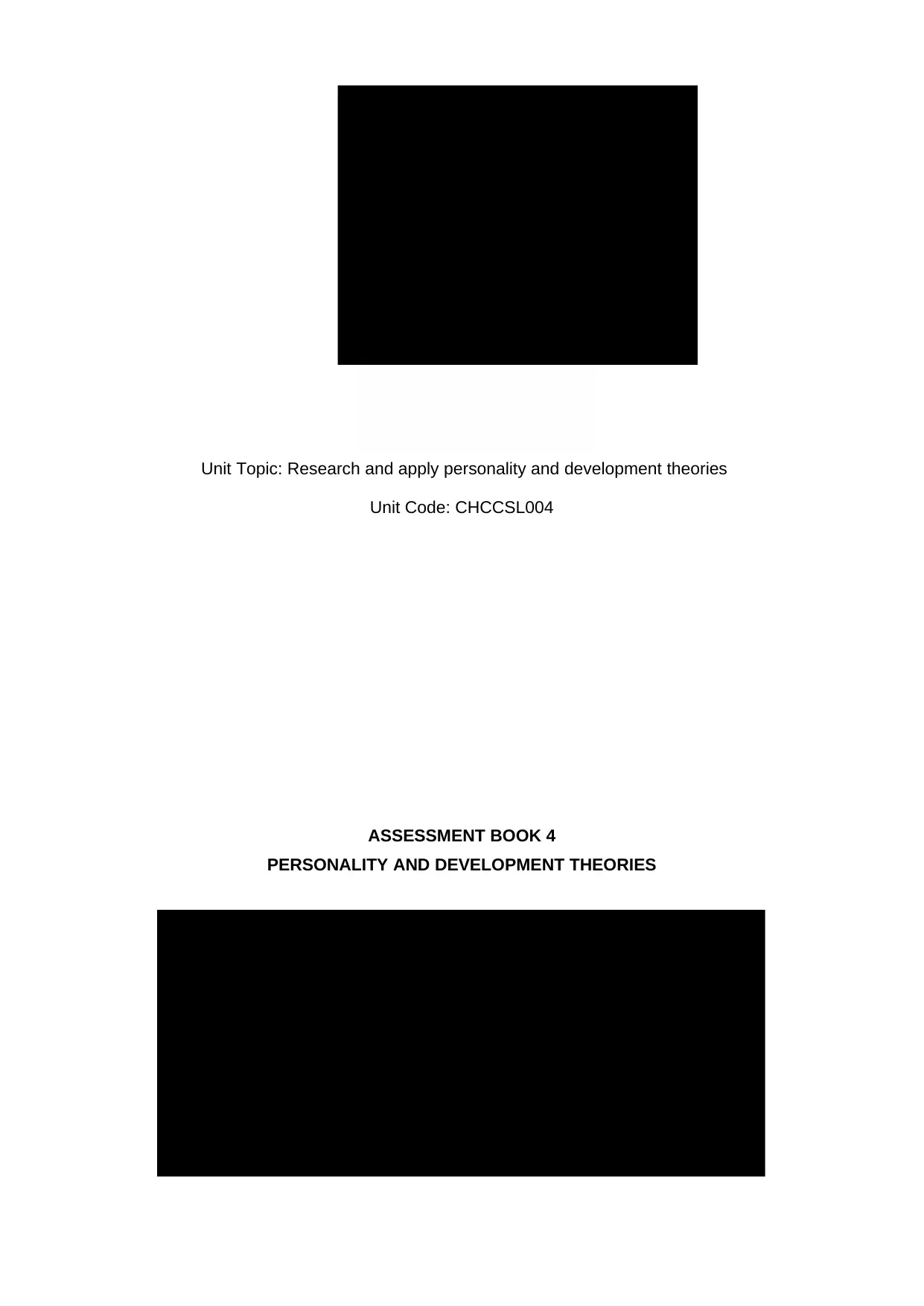
Unit Topic: Research and apply personality and development theories
Unit Code: CHCCSL004
ASSESSMENT BOOK 4
PERSONALITY AND DEVELOPMENT THEORIES
Unit Code: CHCCSL004
ASSESSMENT BOOK 4
PERSONALITY AND DEVELOPMENT THEORIES
Paraphrase This Document
Need a fresh take? Get an instant paraphrase of this document with our AI Paraphraser

This book is protected by copyright and may not be reproduced or copied either in part or in
whole nor used for financial gain without the express approval in writing of the owner
(Australian Institute of Professional Counsellors Pty Ltd ATF AIPC Trust ACN 077 738 035)
of the copyright.
whole nor used for financial gain without the express approval in writing of the owner
(Australian Institute of Professional Counsellors Pty Ltd ATF AIPC Trust ACN 077 738 035)
of the copyright.
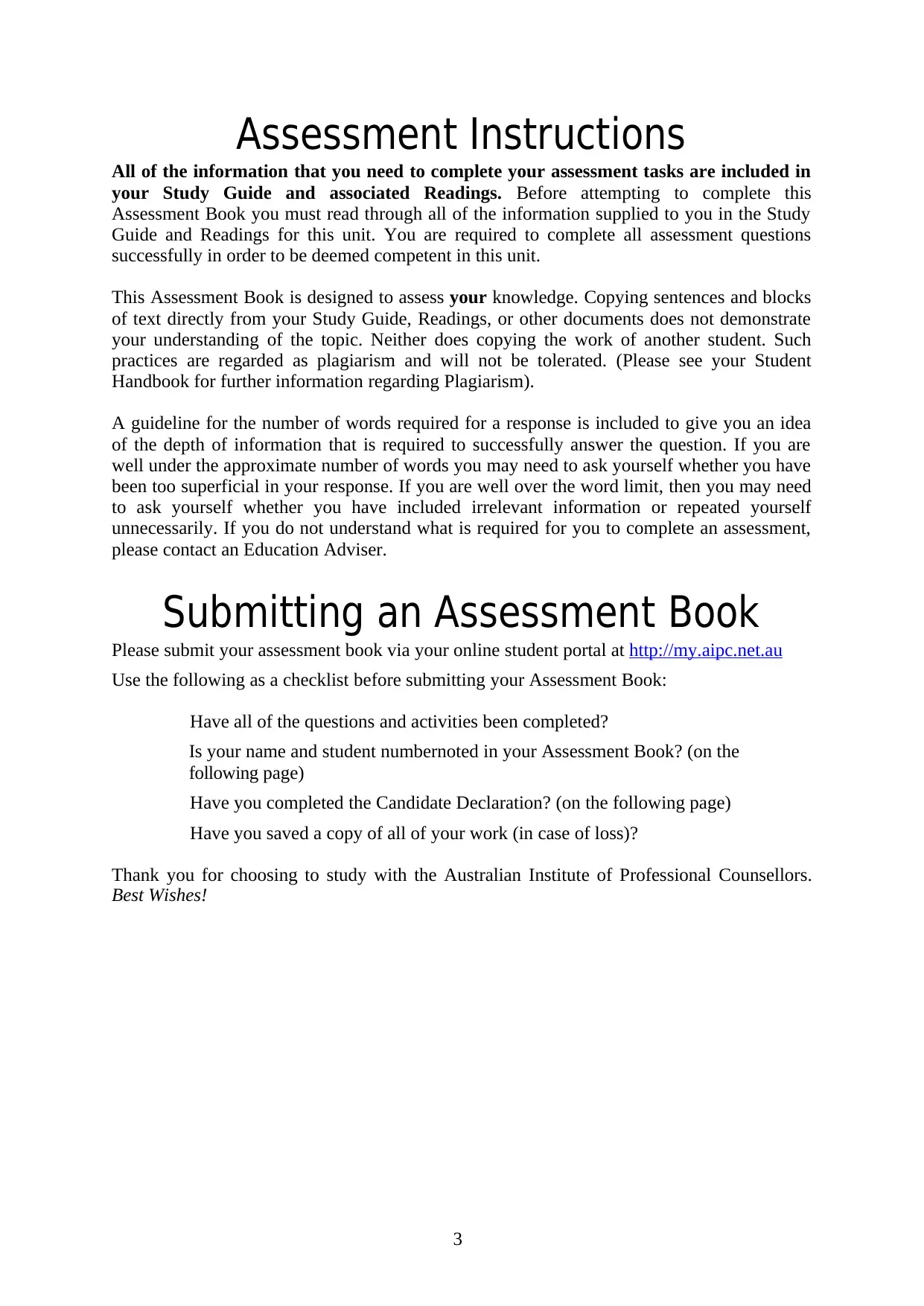
3
Assessment Instructions
All of the information that you need to complete your assessment tasks are included in
your Study Guide and associated Readings. Before attempting to complete this
Assessment Book you must read through all of the information supplied to you in the Study
Guide and Readings for this unit. You are required to complete all assessment questions
successfully in order to be deemed competent in this unit.
This Assessment Book is designed to assess your knowledge. Copying sentences and blocks
of text directly from your Study Guide, Readings, or other documents does not demonstrate
your understanding of the topic. Neither does copying the work of another student. Such
practices are regarded as plagiarism and will not be tolerated. (Please see your Student
Handbook for further information regarding Plagiarism).
A guideline for the number of words required for a response is included to give you an idea
of the depth of information that is required to successfully answer the question. If you are
well under the approximate number of words you may need to ask yourself whether you have
been too superficial in your response. If you are well over the word limit, then you may need
to ask yourself whether you have included irrelevant information or repeated yourself
unnecessarily. If you do not understand what is required for you to complete an assessment,
please contact an Education Adviser.
Submitting an Assessment Book
Please submit your assessment book via your online student portal at http://my.aipc.net.au
Use the following as a checklist before submitting your Assessment Book:
Have all of the questions and activities been completed?
Is your name and student numbernoted in your Assessment Book? (on the
following page)
Have you completed the Candidate Declaration? (on the following page)
Have you saved a copy of all of your work (in case of loss)?
Thank you for choosing to study with the Australian Institute of Professional Counsellors.
Best Wishes!
Assessment Instructions
All of the information that you need to complete your assessment tasks are included in
your Study Guide and associated Readings. Before attempting to complete this
Assessment Book you must read through all of the information supplied to you in the Study
Guide and Readings for this unit. You are required to complete all assessment questions
successfully in order to be deemed competent in this unit.
This Assessment Book is designed to assess your knowledge. Copying sentences and blocks
of text directly from your Study Guide, Readings, or other documents does not demonstrate
your understanding of the topic. Neither does copying the work of another student. Such
practices are regarded as plagiarism and will not be tolerated. (Please see your Student
Handbook for further information regarding Plagiarism).
A guideline for the number of words required for a response is included to give you an idea
of the depth of information that is required to successfully answer the question. If you are
well under the approximate number of words you may need to ask yourself whether you have
been too superficial in your response. If you are well over the word limit, then you may need
to ask yourself whether you have included irrelevant information or repeated yourself
unnecessarily. If you do not understand what is required for you to complete an assessment,
please contact an Education Adviser.
Submitting an Assessment Book
Please submit your assessment book via your online student portal at http://my.aipc.net.au
Use the following as a checklist before submitting your Assessment Book:
Have all of the questions and activities been completed?
Is your name and student numbernoted in your Assessment Book? (on the
following page)
Have you completed the Candidate Declaration? (on the following page)
Have you saved a copy of all of your work (in case of loss)?
Thank you for choosing to study with the Australian Institute of Professional Counsellors.
Best Wishes!
⊘ This is a preview!⊘
Do you want full access?
Subscribe today to unlock all pages.

Trusted by 1+ million students worldwide
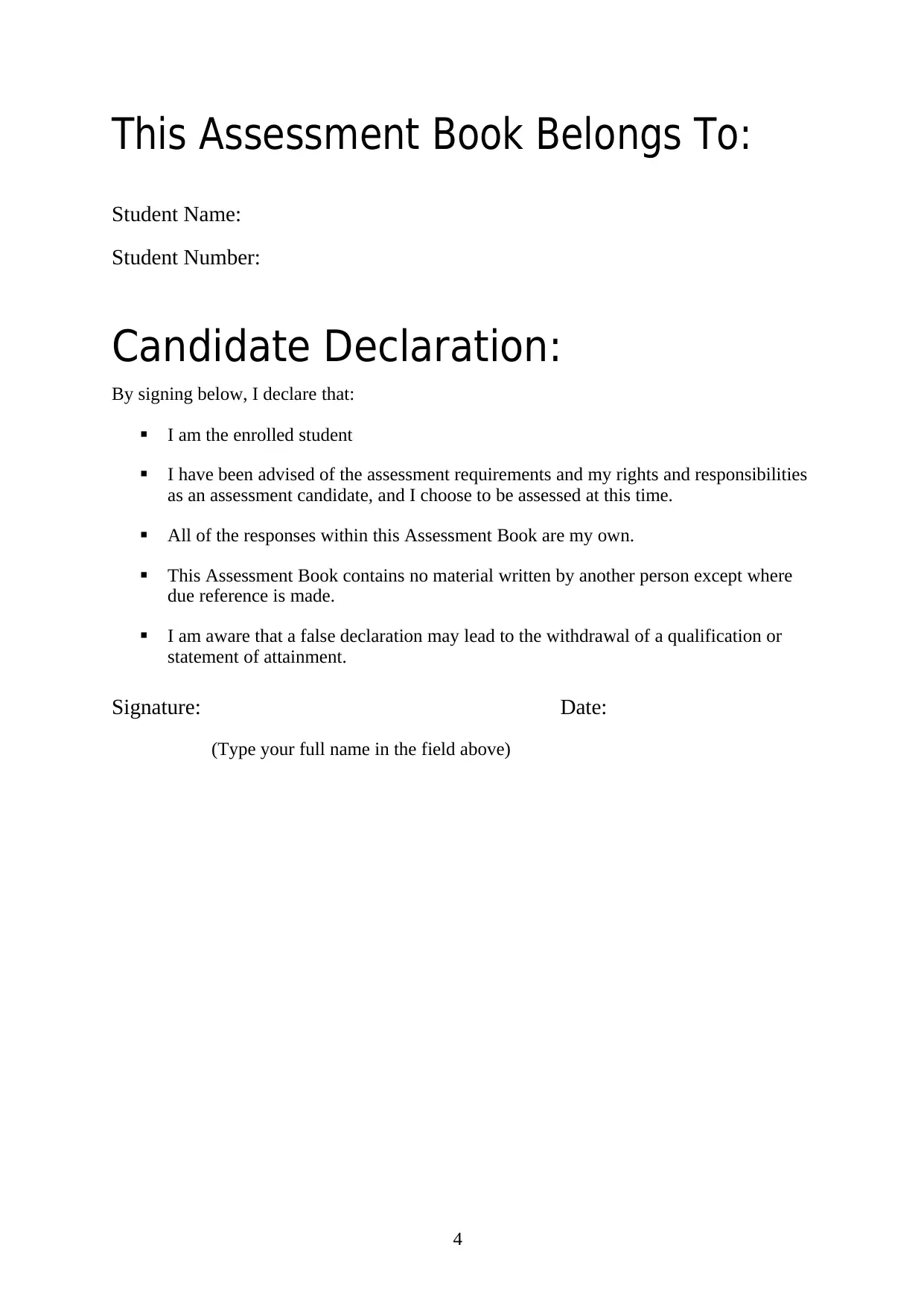
4
This Assessment Book Belongs To:
Student Name:
Student Number:
Candidate Declaration:
By signing below, I declare that:
I am the enrolled student
I have been advised of the assessment requirements and my rights and responsibilities
as an assessment candidate, and I choose to be assessed at this time.
All of the responses within this Assessment Book are my own.
This Assessment Book contains no material written by another person except where
due reference is made.
I am aware that a false declaration may lead to the withdrawal of a qualification or
statement of attainment.
Signature: Date:
(Type your full name in the field above)
This Assessment Book Belongs To:
Student Name:
Student Number:
Candidate Declaration:
By signing below, I declare that:
I am the enrolled student
I have been advised of the assessment requirements and my rights and responsibilities
as an assessment candidate, and I choose to be assessed at this time.
All of the responses within this Assessment Book are my own.
This Assessment Book contains no material written by another person except where
due reference is made.
I am aware that a false declaration may lead to the withdrawal of a qualification or
statement of attainment.
Signature: Date:
(Type your full name in the field above)
Paraphrase This Document
Need a fresh take? Get an instant paraphrase of this document with our AI Paraphraser
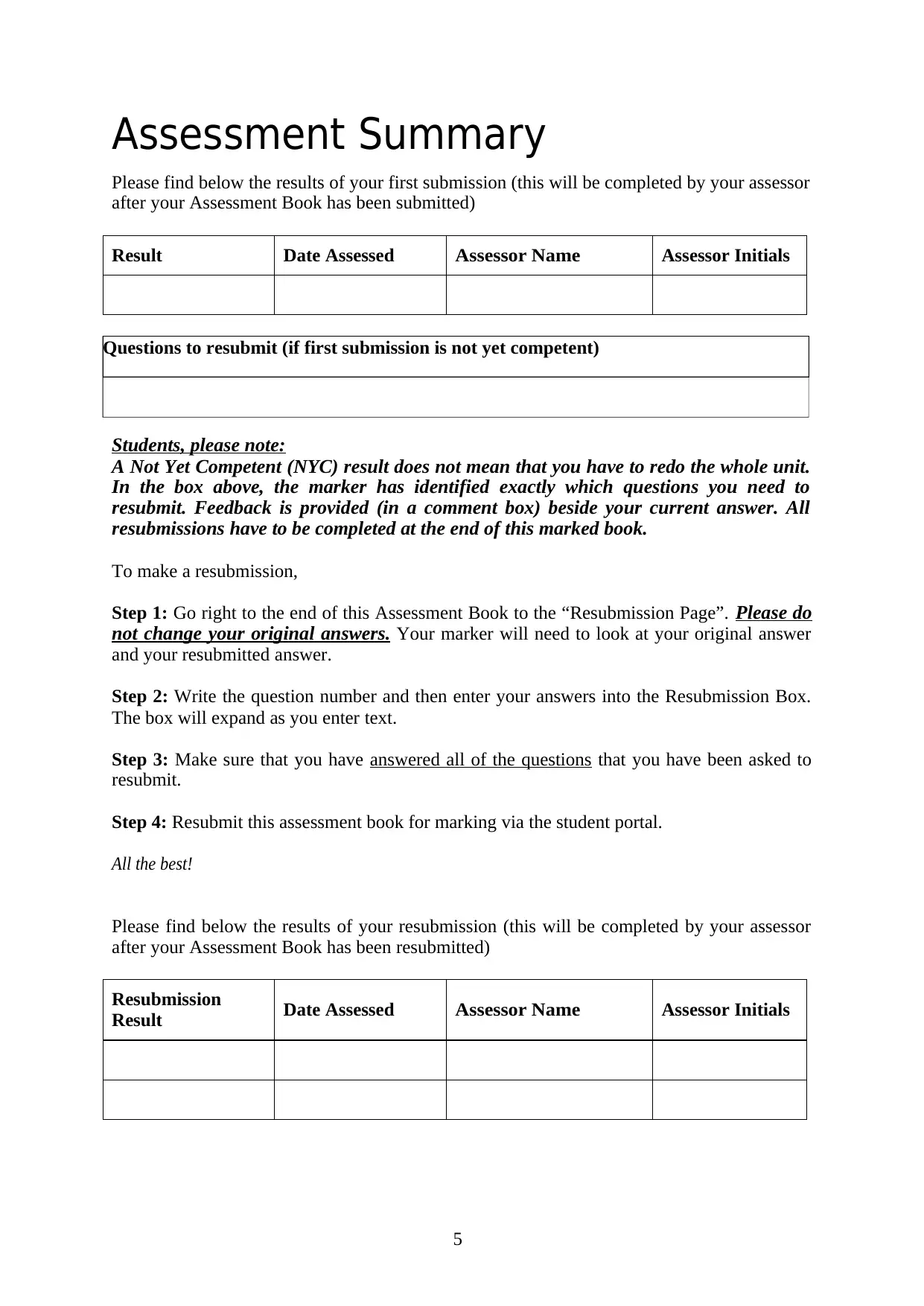
5
Questions to resubmit (if first submission is not yet competent)
Assessment Summary
Please find below the results of your first submission (this will be completed by your assessor
after your Assessment Book has been submitted)
Result Date Assessed Assessor Name Assessor Initials
Students, please note:
A Not Yet Competent (NYC) result does not mean that you have to redo the whole unit.
In the box above, the marker has identified exactly which questions you need to
resubmit. Feedback is provided (in a comment box) beside your current answer. All
resubmissions have to be completed at the end of this marked book.
To make a resubmission,
Step 1: Go right to the end of this Assessment Book to the “Resubmission Page”. Please do
not change your original answers. Your marker will need to look at your original answer
and your resubmitted answer.
Step 2: Write the question number and then enter your answers into the Resubmission Box.
The box will expand as you enter text.
Step 3: Make sure that you have answered all of the questions that you have been asked to
resubmit.
Step 4: Resubmit this assessment book for marking via the student portal.
All the best!
Please find below the results of your resubmission (this will be completed by your assessor
after your Assessment Book has been resubmitted)
Resubmission
Result Date Assessed Assessor Name Assessor Initials
Questions to resubmit (if first submission is not yet competent)
Assessment Summary
Please find below the results of your first submission (this will be completed by your assessor
after your Assessment Book has been submitted)
Result Date Assessed Assessor Name Assessor Initials
Students, please note:
A Not Yet Competent (NYC) result does not mean that you have to redo the whole unit.
In the box above, the marker has identified exactly which questions you need to
resubmit. Feedback is provided (in a comment box) beside your current answer. All
resubmissions have to be completed at the end of this marked book.
To make a resubmission,
Step 1: Go right to the end of this Assessment Book to the “Resubmission Page”. Please do
not change your original answers. Your marker will need to look at your original answer
and your resubmitted answer.
Step 2: Write the question number and then enter your answers into the Resubmission Box.
The box will expand as you enter text.
Step 3: Make sure that you have answered all of the questions that you have been asked to
resubmit.
Step 4: Resubmit this assessment book for marking via the student portal.
All the best!
Please find below the results of your resubmission (this will be completed by your assessor
after your Assessment Book has been resubmitted)
Resubmission
Result Date Assessed Assessor Name Assessor Initials
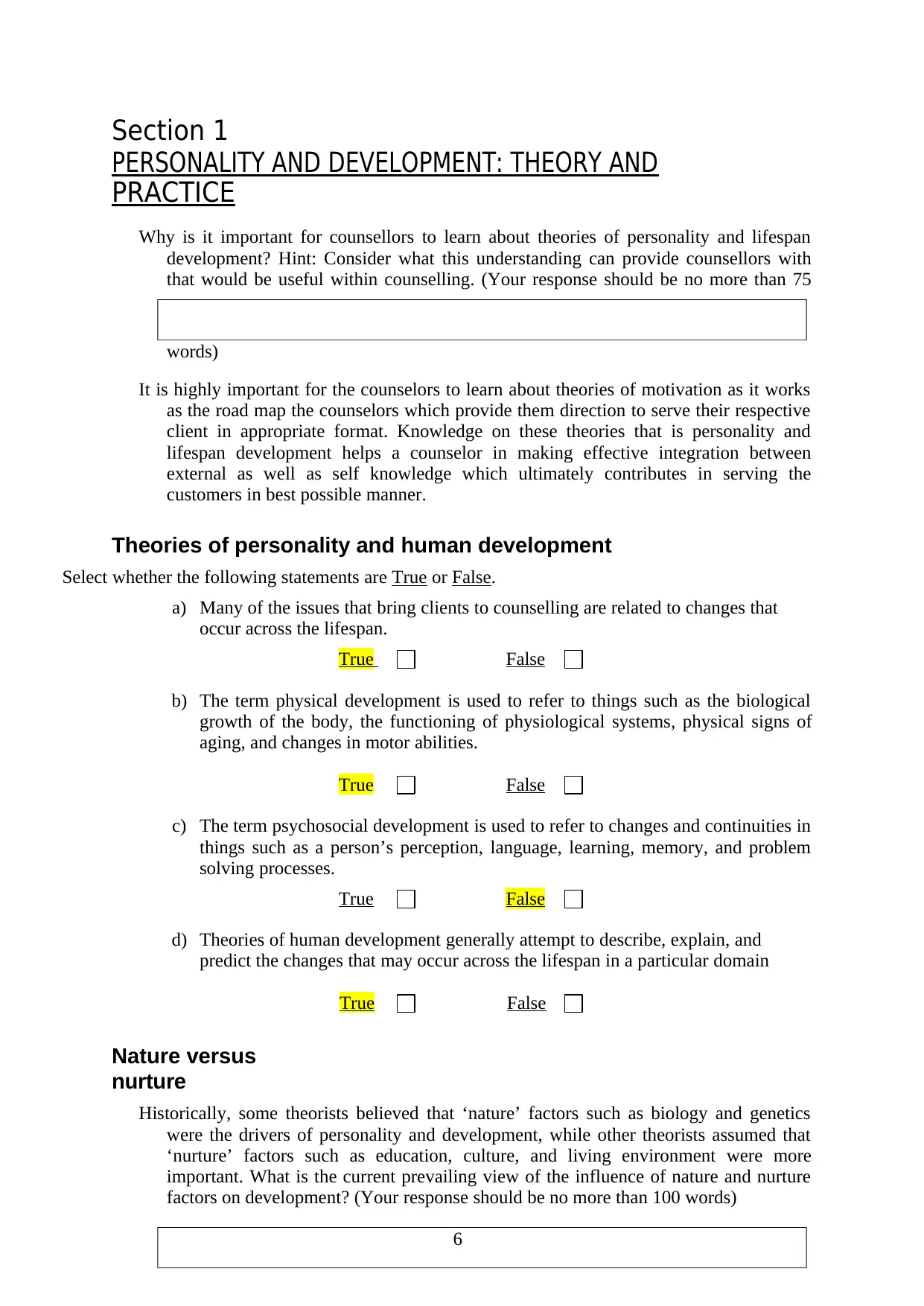
6
Section 1
PERSONALITY AND DEVELOPMENT: THEORY AND
PRACTICE
Why is it important for counsellors to learn about theories of personality and lifespan
development? Hint: Consider what this understanding can provide counsellors with
that would be useful within counselling. (Your response should be no more than 75
words)
It is highly important for the counselors to learn about theories of motivation as it works
as the road map the counselors which provide them direction to serve their respective
client in appropriate format. Knowledge on these theories that is personality and
lifespan development helps a counselor in making effective integration between
external as well as self knowledge which ultimately contributes in serving the
customers in best possible manner.
Theories of personality and human development
Select whether the following statements are True or False.
a) Many of the issues that bring clients to counselling are related to changes that
occur across the lifespan.
True False
b) The term physical development is used to refer to things such as the biological
growth of the body, the functioning of physiological systems, physical signs of
aging, and changes in motor abilities.
True False
c) The term psychosocial development is used to refer to changes and continuities in
things such as a person’s perception, language, learning, memory, and problem
solving processes.
True False
d) Theories of human development generally attempt to describe, explain, and
predict the changes that may occur across the lifespan in a particular domain
Nature versus
nurture
True False
Historically, some theorists believed that ‘nature’ factors such as biology and genetics
were the drivers of personality and development, while other theorists assumed that
‘nurture’ factors such as education, culture, and living environment were more
important. What is the current prevailing view of the influence of nature and nurture
factors on development? (Your response should be no more than 100 words)
Section 1
PERSONALITY AND DEVELOPMENT: THEORY AND
PRACTICE
Why is it important for counsellors to learn about theories of personality and lifespan
development? Hint: Consider what this understanding can provide counsellors with
that would be useful within counselling. (Your response should be no more than 75
words)
It is highly important for the counselors to learn about theories of motivation as it works
as the road map the counselors which provide them direction to serve their respective
client in appropriate format. Knowledge on these theories that is personality and
lifespan development helps a counselor in making effective integration between
external as well as self knowledge which ultimately contributes in serving the
customers in best possible manner.
Theories of personality and human development
Select whether the following statements are True or False.
a) Many of the issues that bring clients to counselling are related to changes that
occur across the lifespan.
True False
b) The term physical development is used to refer to things such as the biological
growth of the body, the functioning of physiological systems, physical signs of
aging, and changes in motor abilities.
True False
c) The term psychosocial development is used to refer to changes and continuities in
things such as a person’s perception, language, learning, memory, and problem
solving processes.
True False
d) Theories of human development generally attempt to describe, explain, and
predict the changes that may occur across the lifespan in a particular domain
Nature versus
nurture
True False
Historically, some theorists believed that ‘nature’ factors such as biology and genetics
were the drivers of personality and development, while other theorists assumed that
‘nurture’ factors such as education, culture, and living environment were more
important. What is the current prevailing view of the influence of nature and nurture
factors on development? (Your response should be no more than 100 words)
⊘ This is a preview!⊘
Do you want full access?
Subscribe today to unlock all pages.

Trusted by 1+ million students worldwide
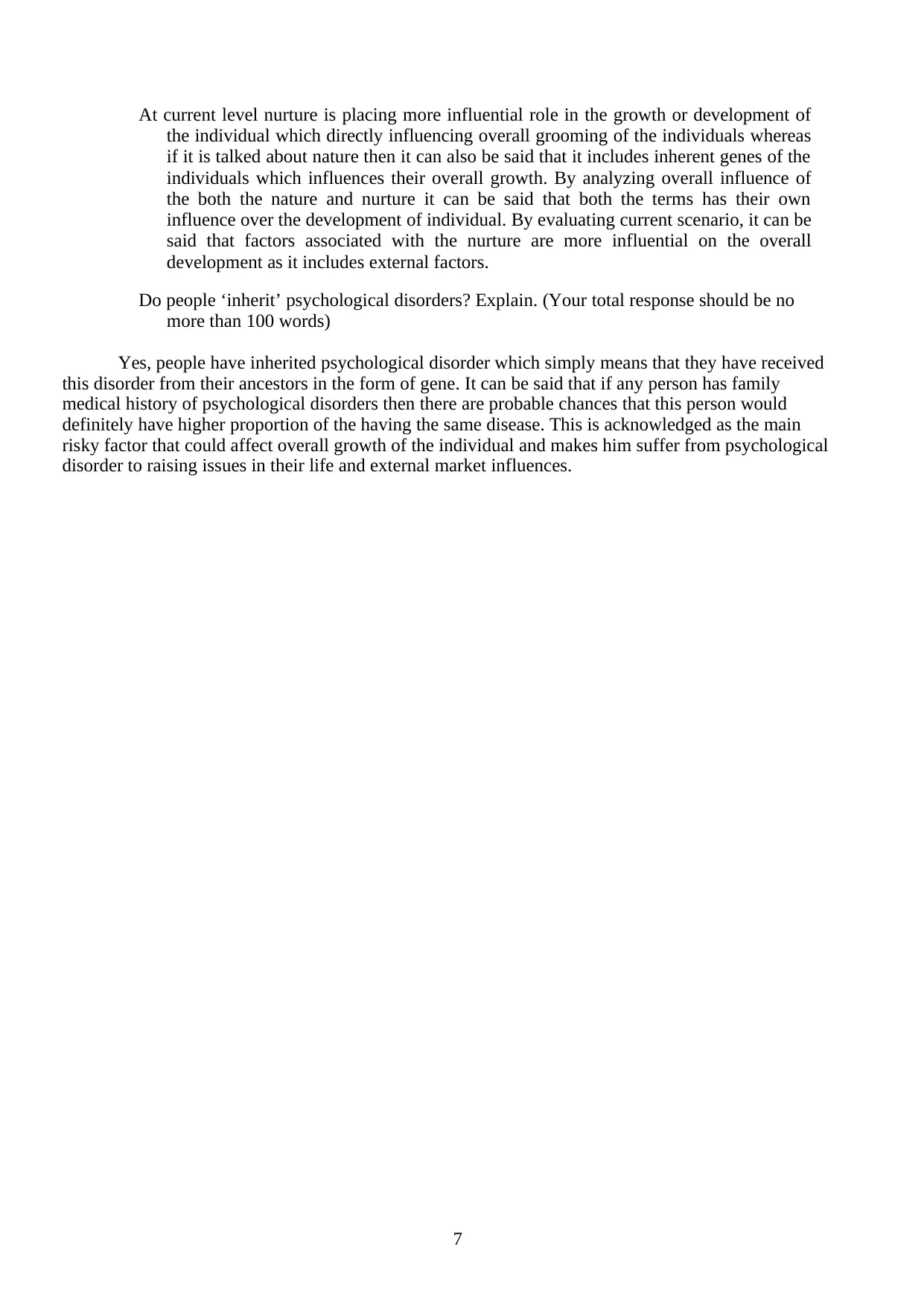
7
At current level nurture is placing more influential role in the growth or development of
the individual which directly influencing overall grooming of the individuals whereas
if it is talked about nature then it can also be said that it includes inherent genes of the
individuals which influences their overall growth. By analyzing overall influence of
the both the nature and nurture it can be said that both the terms has their own
influence over the development of individual. By evaluating current scenario, it can be
said that factors associated with the nurture are more influential on the overall
development as it includes external factors.
Do people ‘inherit’ psychological disorders? Explain. (Your total response should be no
more than 100 words)
Yes, people have inherited psychological disorder which simply means that they have received
this disorder from their ancestors in the form of gene. It can be said that if any person has family
medical history of psychological disorders then there are probable chances that this person would
definitely have higher proportion of the having the same disease. This is acknowledged as the main
risky factor that could affect overall growth of the individual and makes him suffer from psychological
disorder to raising issues in their life and external market influences.
At current level nurture is placing more influential role in the growth or development of
the individual which directly influencing overall grooming of the individuals whereas
if it is talked about nature then it can also be said that it includes inherent genes of the
individuals which influences their overall growth. By analyzing overall influence of
the both the nature and nurture it can be said that both the terms has their own
influence over the development of individual. By evaluating current scenario, it can be
said that factors associated with the nurture are more influential on the overall
development as it includes external factors.
Do people ‘inherit’ psychological disorders? Explain. (Your total response should be no
more than 100 words)
Yes, people have inherited psychological disorder which simply means that they have received
this disorder from their ancestors in the form of gene. It can be said that if any person has family
medical history of psychological disorders then there are probable chances that this person would
definitely have higher proportion of the having the same disease. This is acknowledged as the main
risky factor that could affect overall growth of the individual and makes him suffer from psychological
disorder to raising issues in their life and external market influences.
Paraphrase This Document
Need a fresh take? Get an instant paraphrase of this document with our AI Paraphraser
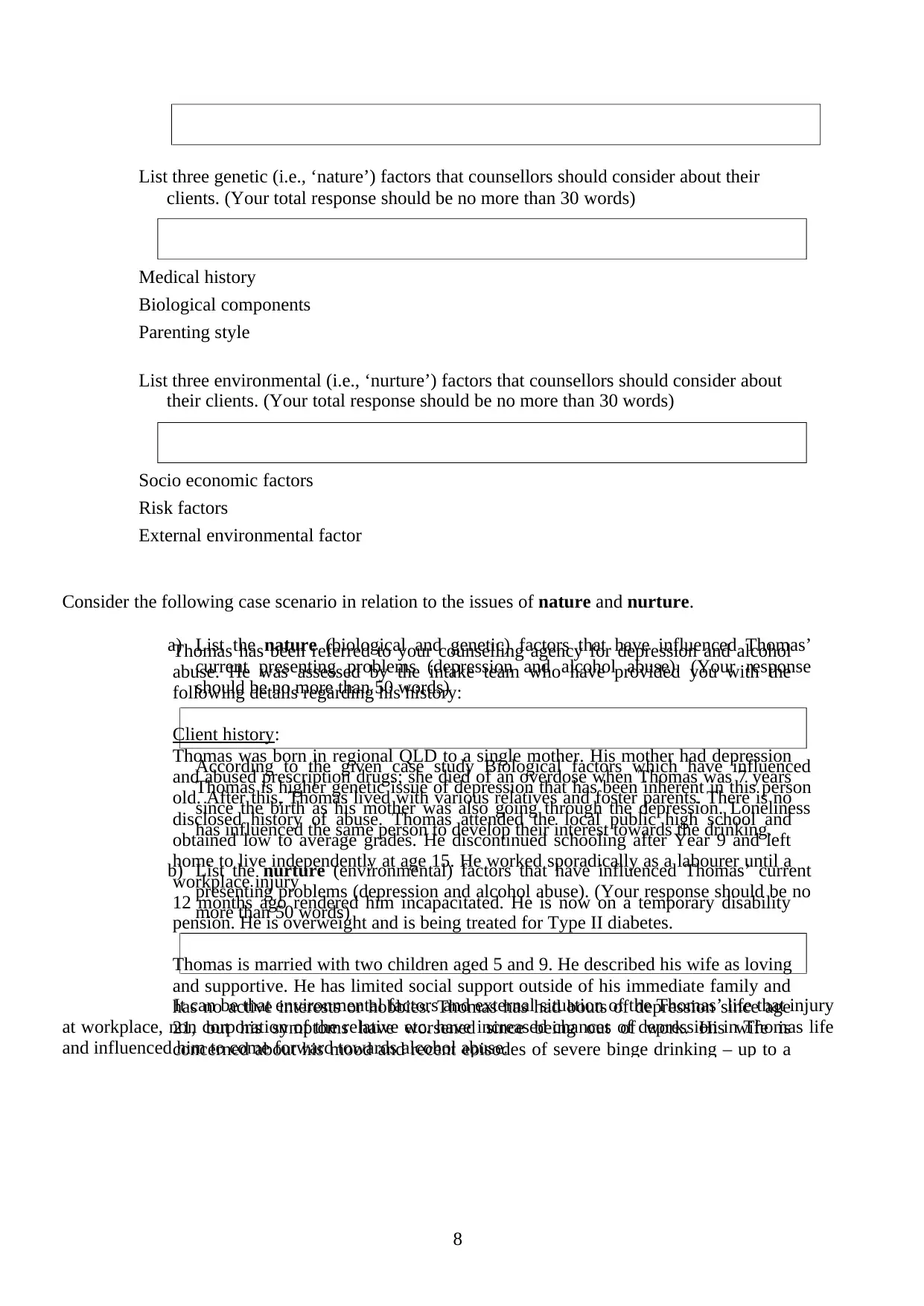
Thomas has been referred to your counselling agency for depression and alcohol
abuse. He was assessed by the intake team who have provided you with the
following details regarding his history:
Client history:
Thomas was born in regional QLD to a single mother. His mother had depression
and abused prescription drugs; she died of an overdose when Thomas was 7 years
old. After this, Thomas lived with various relatives and foster parents. There is no
disclosed history of abuse. Thomas attended the local public high school and
obtained low to average grades. He discontinued schooling after Year 9 and left
home to live independently at age 15. He worked sporadically as a labourer until a
workplace injury
12 months ago rendered him incapacitated. He is now on a temporary disability
pension. He is overweight and is being treated for Type II diabetes.
Thomas is married with two children aged 5 and 9. He described his wife as loving
and supportive. He has limited social support outside of his immediate family and
has no active interests or hobbies. Thomas has had bouts of depression since age
21, but his symptoms have worsened since being out of work. His wife is
concerned about his mood and recent episodes of severe binge drinking – up to a
8
List three genetic (i.e., ‘nature’) factors that counsellors should consider about their
clients. (Your total response should be no more than 30 words)
Medical history
Biological components
Parenting style
List three environmental (i.e., ‘nurture’) factors that counsellors should consider about
their clients. (Your total response should be no more than 30 words)
Socio economic factors
Risk factors
External environmental factor
Consider the following case scenario in relation to the issues of nature and nurture.
a) List the nature (biological and genetic) factors that have influenced Thomas’
current presenting problems (depression and alcohol abuse). (Your response
should be no more than 50 words)
According to the given case study Biological factors which have influenced
Thomas is higher genetic issue of depression that has been inherent in this person
since the birth as his mother was also going through the depression. Loneliness
has influenced the same person to develop their interest towards the drinking.
b) List the nurture (environmental) factors that have influenced Thomas’ current
presenting problems (depression and alcohol abuse). (Your response should be no
more than 50 words)
It can be that environmental factors and external situation of the Thomas’ life that injury
at workplace, non corporation of the relative etc. have increased chances of depression in Thomas life
and influenced him to come forward towards alcohol abuse.
abuse. He was assessed by the intake team who have provided you with the
following details regarding his history:
Client history:
Thomas was born in regional QLD to a single mother. His mother had depression
and abused prescription drugs; she died of an overdose when Thomas was 7 years
old. After this, Thomas lived with various relatives and foster parents. There is no
disclosed history of abuse. Thomas attended the local public high school and
obtained low to average grades. He discontinued schooling after Year 9 and left
home to live independently at age 15. He worked sporadically as a labourer until a
workplace injury
12 months ago rendered him incapacitated. He is now on a temporary disability
pension. He is overweight and is being treated for Type II diabetes.
Thomas is married with two children aged 5 and 9. He described his wife as loving
and supportive. He has limited social support outside of his immediate family and
has no active interests or hobbies. Thomas has had bouts of depression since age
21, but his symptoms have worsened since being out of work. His wife is
concerned about his mood and recent episodes of severe binge drinking – up to a
8
List three genetic (i.e., ‘nature’) factors that counsellors should consider about their
clients. (Your total response should be no more than 30 words)
Medical history
Biological components
Parenting style
List three environmental (i.e., ‘nurture’) factors that counsellors should consider about
their clients. (Your total response should be no more than 30 words)
Socio economic factors
Risk factors
External environmental factor
Consider the following case scenario in relation to the issues of nature and nurture.
a) List the nature (biological and genetic) factors that have influenced Thomas’
current presenting problems (depression and alcohol abuse). (Your response
should be no more than 50 words)
According to the given case study Biological factors which have influenced
Thomas is higher genetic issue of depression that has been inherent in this person
since the birth as his mother was also going through the depression. Loneliness
has influenced the same person to develop their interest towards the drinking.
b) List the nurture (environmental) factors that have influenced Thomas’ current
presenting problems (depression and alcohol abuse). (Your response should be no
more than 50 words)
It can be that environmental factors and external situation of the Thomas’ life that injury
at workplace, non corporation of the relative etc. have increased chances of depression in Thomas life
and influenced him to come forward towards alcohol abuse.
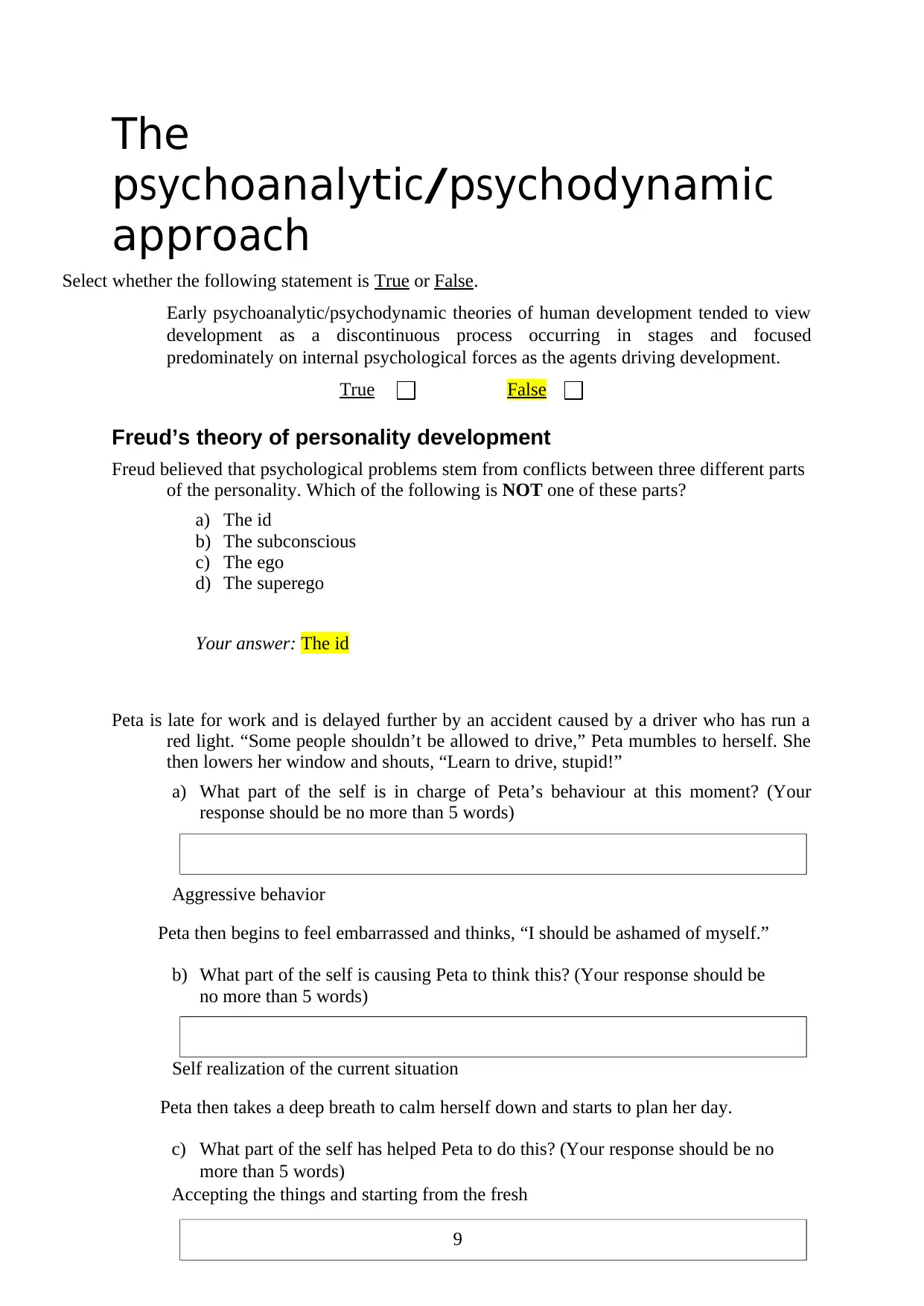
9
T he
p s yc ho an al yt ic / ps yc ho d ynam i c
ap p ro ac h
Select whether the following statement is True or False.
Early psychoanalytic/psychodynamic theories of human development tended to view
development as a discontinuous process occurring in stages and focused
predominately on internal psychological forces as the agents driving development.
True False
Freud’s theory of personality development
Freud believed that psychological problems stem from conflicts between three different parts
of the personality. Which of the following is NOT one of these parts?
a) The id
b) The subconscious
c) The ego
d) The superego
Your answer: The id
Peta is late for work and is delayed further by an accident caused by a driver who has run a
red light. “Some people shouldn’t be allowed to drive,” Peta mumbles to herself. She
then lowers her window and shouts, “Learn to drive, stupid!”
a) What part of the self is in charge of Peta’s behaviour at this moment? (Your
response should be no more than 5 words)
Aggressive behavior
Peta then begins to feel embarrassed and thinks, “I should be ashamed of myself.”
b) What part of the self is causing Peta to think this? (Your response should be
no more than 5 words)
Self realization of the current situation
Peta then takes a deep breath to calm herself down and starts to plan her day.
c) What part of the self has helped Peta to do this? (Your response should be no
more than 5 words)
Accepting the things and starting from the fresh
T he
p s yc ho an al yt ic / ps yc ho d ynam i c
ap p ro ac h
Select whether the following statement is True or False.
Early psychoanalytic/psychodynamic theories of human development tended to view
development as a discontinuous process occurring in stages and focused
predominately on internal psychological forces as the agents driving development.
True False
Freud’s theory of personality development
Freud believed that psychological problems stem from conflicts between three different parts
of the personality. Which of the following is NOT one of these parts?
a) The id
b) The subconscious
c) The ego
d) The superego
Your answer: The id
Peta is late for work and is delayed further by an accident caused by a driver who has run a
red light. “Some people shouldn’t be allowed to drive,” Peta mumbles to herself. She
then lowers her window and shouts, “Learn to drive, stupid!”
a) What part of the self is in charge of Peta’s behaviour at this moment? (Your
response should be no more than 5 words)
Aggressive behavior
Peta then begins to feel embarrassed and thinks, “I should be ashamed of myself.”
b) What part of the self is causing Peta to think this? (Your response should be
no more than 5 words)
Self realization of the current situation
Peta then takes a deep breath to calm herself down and starts to plan her day.
c) What part of the self has helped Peta to do this? (Your response should be no
more than 5 words)
Accepting the things and starting from the fresh
⊘ This is a preview!⊘
Do you want full access?
Subscribe today to unlock all pages.

Trusted by 1+ million students worldwide
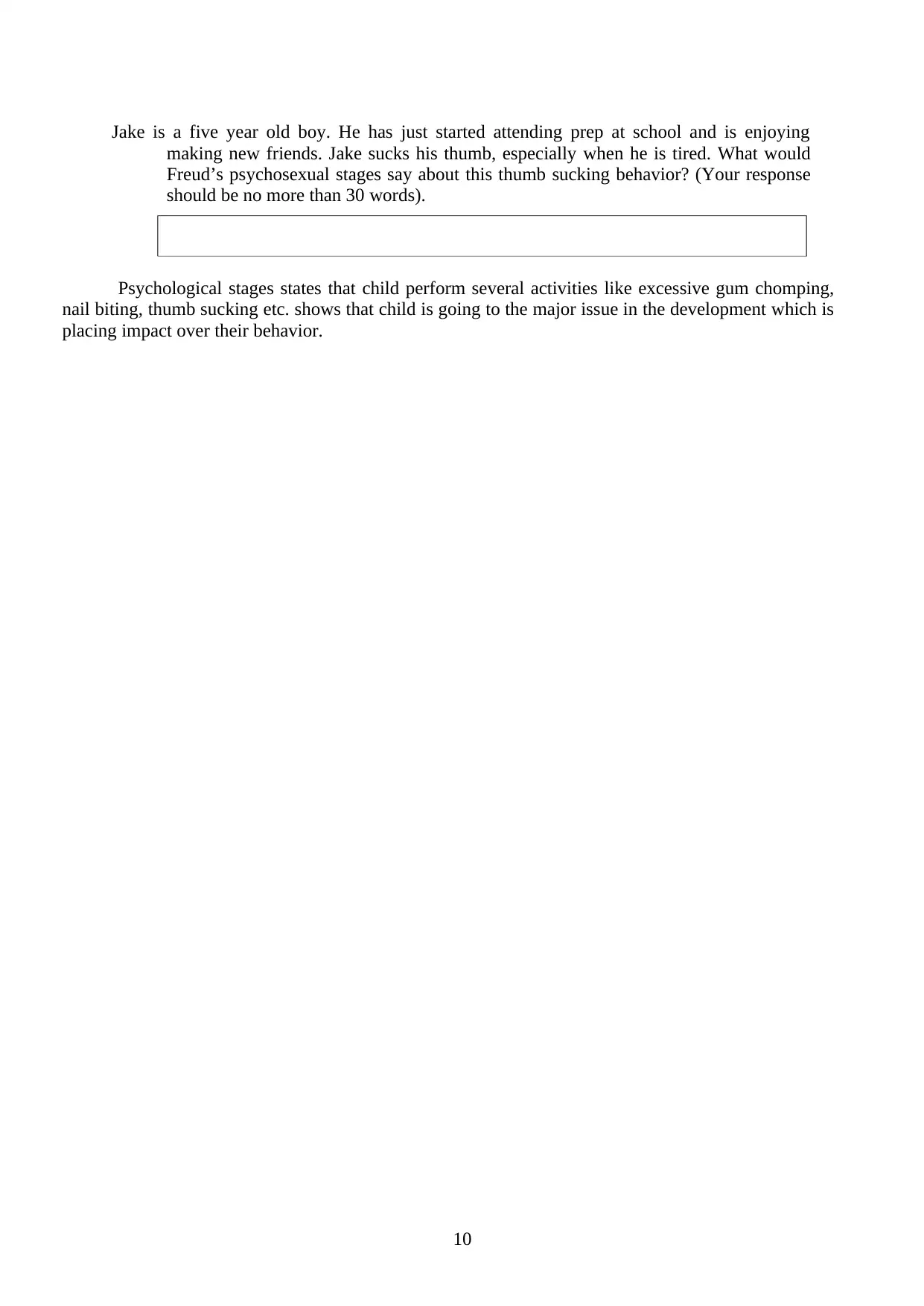
10
Jake is a five year old boy. He has just started attending prep at school and is enjoying
making new friends. Jake sucks his thumb, especially when he is tired. What would
Freud’s psychosexual stages say about this thumb sucking behavior? (Your response
should be no more than 30 words).
Psychological stages states that child perform several activities like excessive gum chomping,
nail biting, thumb sucking etc. shows that child is going to the major issue in the development which is
placing impact over their behavior.
Jake is a five year old boy. He has just started attending prep at school and is enjoying
making new friends. Jake sucks his thumb, especially when he is tired. What would
Freud’s psychosexual stages say about this thumb sucking behavior? (Your response
should be no more than 30 words).
Psychological stages states that child perform several activities like excessive gum chomping,
nail biting, thumb sucking etc. shows that child is going to the major issue in the development which is
placing impact over their behavior.
Paraphrase This Document
Need a fresh take? Get an instant paraphrase of this document with our AI Paraphraser
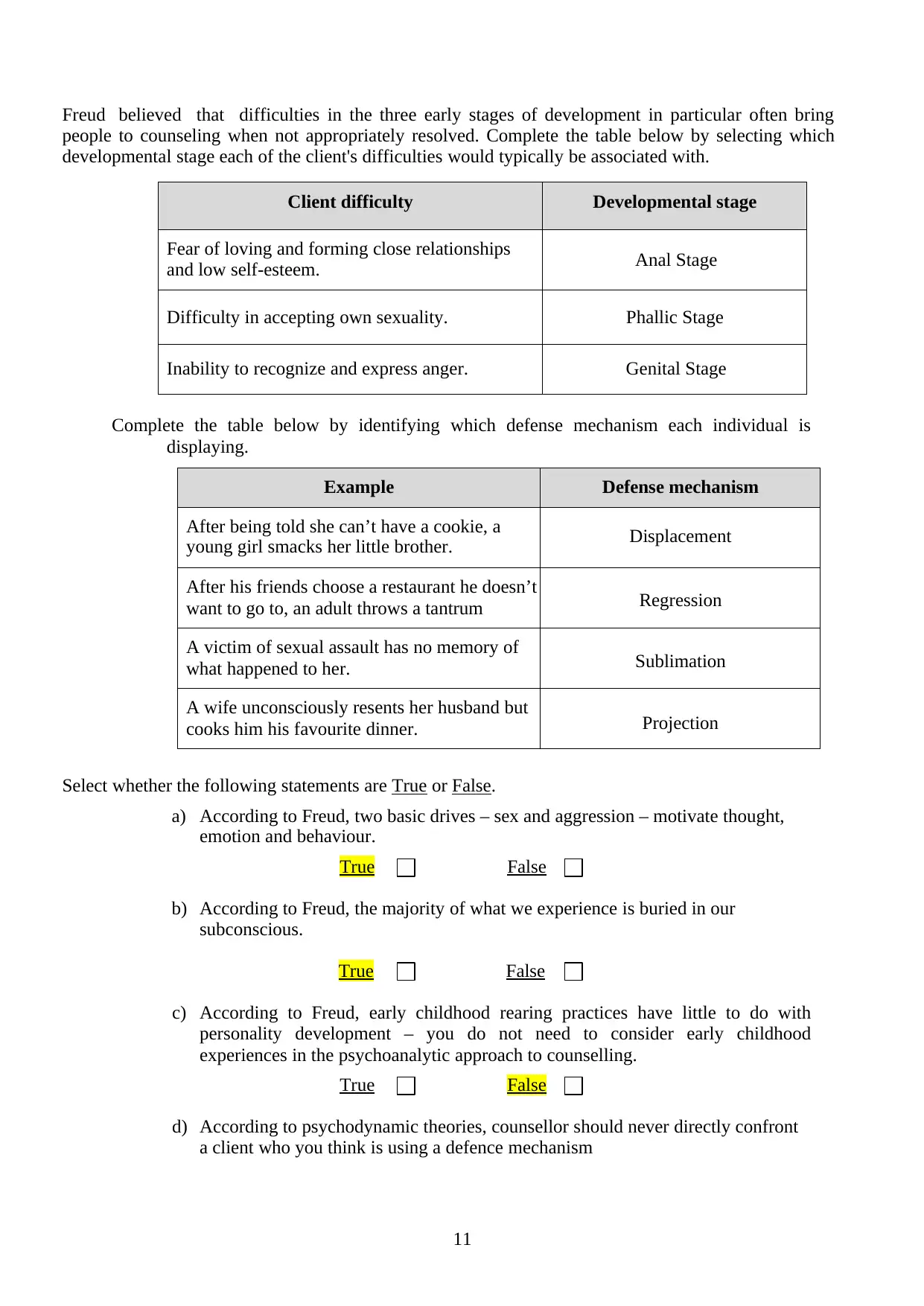
11
Freud believed that difficulties in the three early stages of development in particular often bring
people to counseling when not appropriately resolved. Complete the table below by selecting which
developmental stage each of the client's difficulties would typically be associated with.
Client difficulty Developmental stage
Fear of loving and forming close relationships
and low self-esteem. Anal Stage
Difficulty in accepting own sexuality. Phallic Stage
Inability to recognize and express anger. Genital Stage
Complete the table below by identifying which defense mechanism each individual is
displaying.
Example Defense mechanism
After being told she can’t have a cookie, a
young girl smacks her little brother. Displacement
After his friends choose a restaurant he doesn’t
want to go to, an adult throws a tantrum Regression
A victim of sexual assault has no memory of
what happened to her. Sublimation
A wife unconsciously resents her husband but
cooks him his favourite dinner. Projection
Select whether the following statements are True or False.
a) According to Freud, two basic drives – sex and aggression – motivate thought,
emotion and behaviour.
True False
b) According to Freud, the majority of what we experience is buried in our
subconscious.
True False
c) According to Freud, early childhood rearing practices have little to do with
personality development – you do not need to consider early childhood
experiences in the psychoanalytic approach to counselling.
True False
d) According to psychodynamic theories, counsellor should never directly confront
a client who you think is using a defence mechanism
Freud believed that difficulties in the three early stages of development in particular often bring
people to counseling when not appropriately resolved. Complete the table below by selecting which
developmental stage each of the client's difficulties would typically be associated with.
Client difficulty Developmental stage
Fear of loving and forming close relationships
and low self-esteem. Anal Stage
Difficulty in accepting own sexuality. Phallic Stage
Inability to recognize and express anger. Genital Stage
Complete the table below by identifying which defense mechanism each individual is
displaying.
Example Defense mechanism
After being told she can’t have a cookie, a
young girl smacks her little brother. Displacement
After his friends choose a restaurant he doesn’t
want to go to, an adult throws a tantrum Regression
A victim of sexual assault has no memory of
what happened to her. Sublimation
A wife unconsciously resents her husband but
cooks him his favourite dinner. Projection
Select whether the following statements are True or False.
a) According to Freud, two basic drives – sex and aggression – motivate thought,
emotion and behaviour.
True False
b) According to Freud, the majority of what we experience is buried in our
subconscious.
True False
c) According to Freud, early childhood rearing practices have little to do with
personality development – you do not need to consider early childhood
experiences in the psychoanalytic approach to counselling.
True False
d) According to psychodynamic theories, counsellor should never directly confront
a client who you think is using a defence mechanism
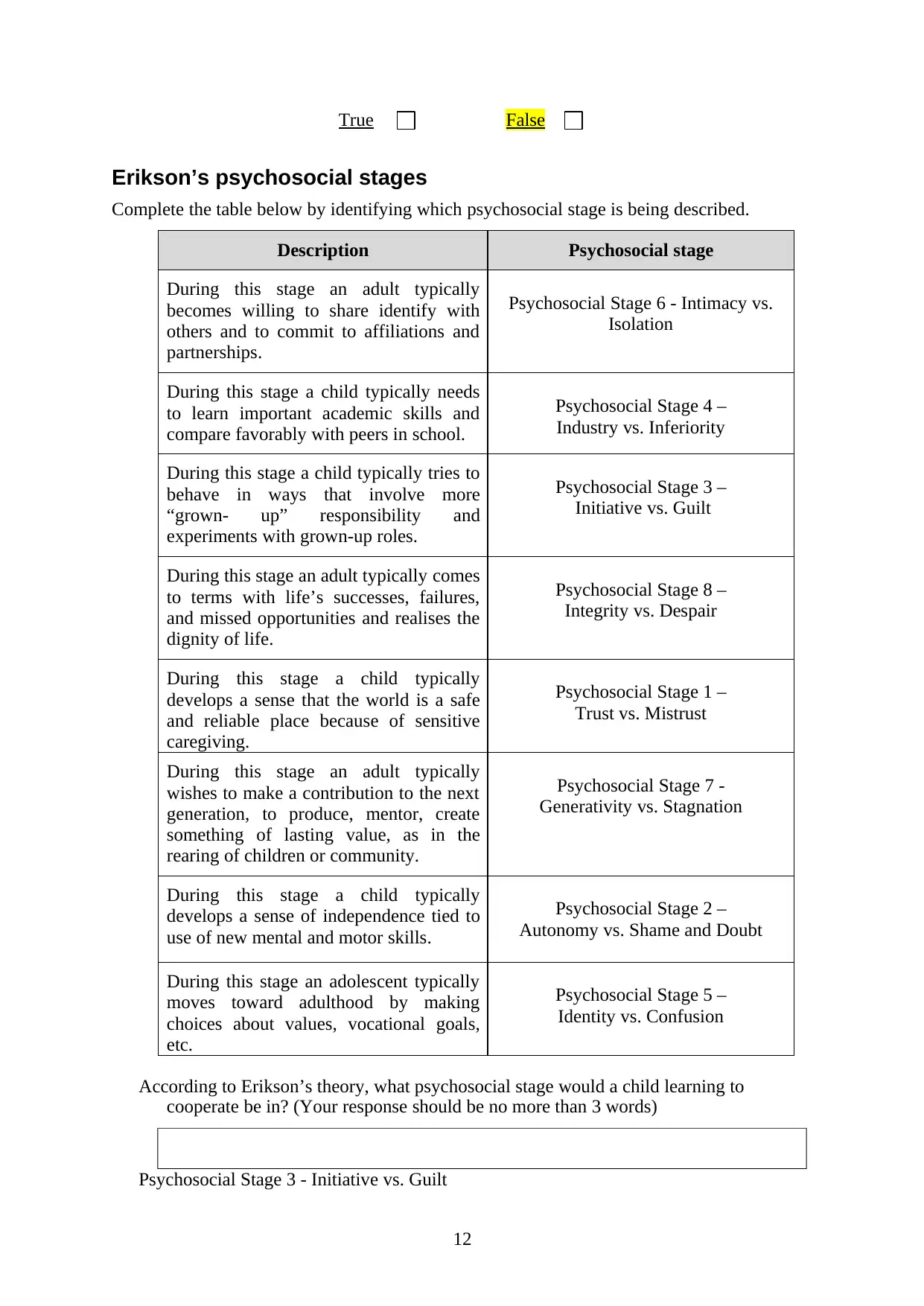
12
True False
Erikson’s psychosocial stages
Complete the table below by identifying which psychosocial stage is being described.
Description Psychosocial stage
During this stage an adult typically
becomes willing to share identify with
others and to commit to affiliations and
partnerships.
Psychosocial Stage 6 - Intimacy vs.
Isolation
During this stage a child typically needs
to learn important academic skills and
compare favorably with peers in school.
Psychosocial Stage 4 –
Industry vs. Inferiority
During this stage a child typically tries to
behave in ways that involve more
“grown- up” responsibility and
experiments with grown-up roles.
Psychosocial Stage 3 –
Initiative vs. Guilt
During this stage an adult typically comes
to terms with life’s successes, failures,
and missed opportunities and realises the
dignity of life.
Psychosocial Stage 8 –
Integrity vs. Despair
During this stage a child typically
develops a sense that the world is a safe
and reliable place because of sensitive
caregiving.
Psychosocial Stage 1 –
Trust vs. Mistrust
During this stage an adult typically
wishes to make a contribution to the next
generation, to produce, mentor, create
something of lasting value, as in the
rearing of children or community.
Psychosocial Stage 7 -
Generativity vs. Stagnation
During this stage a child typically
develops a sense of independence tied to
use of new mental and motor skills.
Psychosocial Stage 2 –
Autonomy vs. Shame and Doubt
During this stage an adolescent typically
moves toward adulthood by making
choices about values, vocational goals,
etc.
Psychosocial Stage 5 –
Identity vs. Confusion
According to Erikson’s theory, what psychosocial stage would a child learning to
cooperate be in? (Your response should be no more than 3 words)
Psychosocial Stage 3 - Initiative vs. Guilt
True False
Erikson’s psychosocial stages
Complete the table below by identifying which psychosocial stage is being described.
Description Psychosocial stage
During this stage an adult typically
becomes willing to share identify with
others and to commit to affiliations and
partnerships.
Psychosocial Stage 6 - Intimacy vs.
Isolation
During this stage a child typically needs
to learn important academic skills and
compare favorably with peers in school.
Psychosocial Stage 4 –
Industry vs. Inferiority
During this stage a child typically tries to
behave in ways that involve more
“grown- up” responsibility and
experiments with grown-up roles.
Psychosocial Stage 3 –
Initiative vs. Guilt
During this stage an adult typically comes
to terms with life’s successes, failures,
and missed opportunities and realises the
dignity of life.
Psychosocial Stage 8 –
Integrity vs. Despair
During this stage a child typically
develops a sense that the world is a safe
and reliable place because of sensitive
caregiving.
Psychosocial Stage 1 –
Trust vs. Mistrust
During this stage an adult typically
wishes to make a contribution to the next
generation, to produce, mentor, create
something of lasting value, as in the
rearing of children or community.
Psychosocial Stage 7 -
Generativity vs. Stagnation
During this stage a child typically
develops a sense of independence tied to
use of new mental and motor skills.
Psychosocial Stage 2 –
Autonomy vs. Shame and Doubt
During this stage an adolescent typically
moves toward adulthood by making
choices about values, vocational goals,
etc.
Psychosocial Stage 5 –
Identity vs. Confusion
According to Erikson’s theory, what psychosocial stage would a child learning to
cooperate be in? (Your response should be no more than 3 words)
Psychosocial Stage 3 - Initiative vs. Guilt
⊘ This is a preview!⊘
Do you want full access?
Subscribe today to unlock all pages.

Trusted by 1+ million students worldwide
1 out of 35
Related Documents
Your All-in-One AI-Powered Toolkit for Academic Success.
+13062052269
info@desklib.com
Available 24*7 on WhatsApp / Email
![[object Object]](/_next/static/media/star-bottom.7253800d.svg)
Unlock your academic potential
Copyright © 2020–2026 A2Z Services. All Rights Reserved. Developed and managed by ZUCOL.


